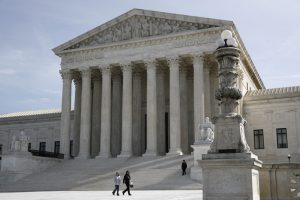SCOTUS Says Violating the Constitution Is Fine if Temporary
< < Go Back

In this March 16, 2020 photo, people walk outside the Supreme Court in Washington. The Supreme Court sided unanimously Monday with North Carolina in a copyright fight with a company that has documented the salvage of the pirate Blackbeard’s ship off the state’s coast. Justice Elena Kagan wrote for the court that the company’s copyright infringement lawsuit, which she called “a modern form of piracy,” could not go forward because the Constitution generally protects states from lawsuits in federal courts. (AP Photo/Patrick Semansky)
Guess what’s unconstitutional? When the federal government tells property owners they cannot be paid by tenants who rent their property.
In September 2020, the U.S. Centers for Disease Control and Prevention (CDC) told state courts that they could not hear eviction proceedings and unilaterally declared that private property owners had to allow non-paying renters to live rent-free until the CDC says otherwise.
If this sounds illegal and unconstitutional, that is because it is.
But what may turn heads even more is that the United States Supreme Court is allowing the CDC to continue to ignore judicial rulings that the moratorium is illegal and unconstitutional because it will expire in a few weeks anyway. Ignoring the fact that the moratorium has already expired and been renewed three times, every day the moratorium is in place, private property owners are being deprived their constitutional rights.
Justice Kavanaugh concluded his opinion by stating that if Congress were to sign off on the CDC’s moratorium through formal legislation, he would be willing to leave the eviction ban intact. But Justice Kavanaugh misses the point—even by an act of Congress, the moratorium is unconstitutional.
More From Townhall:



